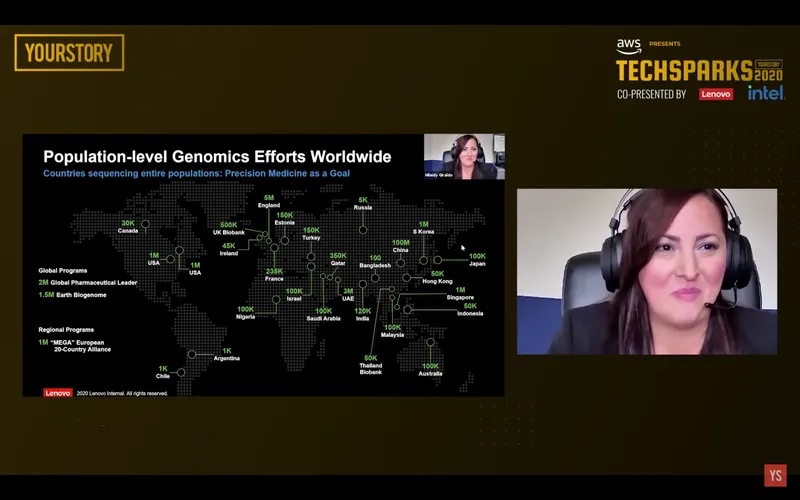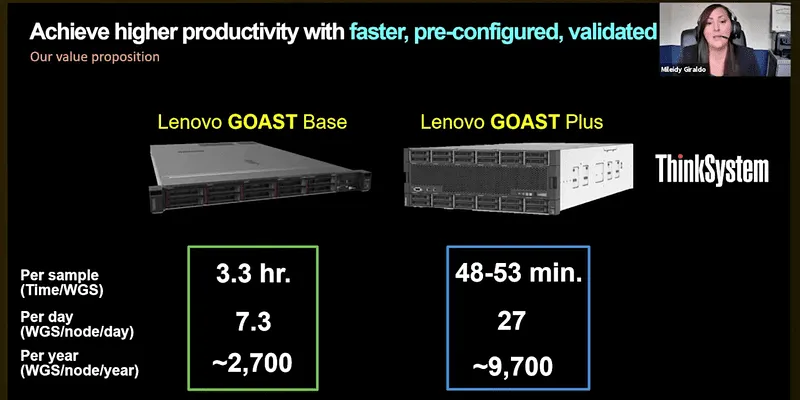[TechSparks 2020] Lenovo’s Mileidy Giraldo reveals the future of life sciences: high performance computing and AI
On day 3 of TechSparks 2020, Mileidy Giraldo, Global Lead, Life Sciences, HPC & AI at Lenovo Data Center Group, spoke about how precision medicine based on genome sequencing can solve medical challenges amidst the pandemic and in the future.
COVID-19 has brought the entire world to a standstill. Scientists and medical experts concur that the virus manifests differently with different people, and are working to find a solution to this global challenge.
This is where modern technology comes into play: analysing the genome of an individual can help make medicines more accurate, precise, and ensure better results.
On day 3 of the virtual edition of TechSparks 2020, Mileidy Giraldo, Global Lead, Life Sciences, HPC & AI at Lenovo Data Center Group, took a masterclass on “combining high performance computing and AI to solve humanity's greatest challenges”.
Displaying a futuristic clinical imagery, Mileidy said this was the type of healthcare that took into account your specific genes, lifestyle, and environment to treat you.
“This is what we call ‘precision-health personalised medicine’, where we can measure your individual susceptibilities to disease, your response to specific treatments, and know what things can happen. This way, we can tailor health to maximise benefit and minimise harm,” Mileidy said.
Precision healthcare
Mileidy said the goal was to make predictive, interactive medicine rather than reactive medicine. “Getting there is much easier now than what we had when the first genome was sequenced,” she said.
She revealed the time taken and cost for the first genome sequencing in 1990: 13 years and $3 million. “But after all that effort, we were left underwhelmed, because even though this sequence holds the power to great medical breakthroughs, the scientific community quickly brought forth the challenge of sequencing another genome,” she shares.

A screen grab from Mileidy Giraldo's masterclass
Sequencing and genomic costs have been brought down dramatically, and it is now easier to scale with the current technology. Nearly all biomedical projects depend on high performance computing (HPC) to power such complex ‘OMICS’ (genomics, transcriptomics, proteomics, metabolonomics, etc).
Taking the example of the pandemic, she said, “The mechanisms of infection of the SARS-CoV-2 vary from person-to-person, triggering a different response in different individuals. Many researchers have been trying to understand why the virus originated and the susceptibility of each individual to it.”
Genome sequencing
Mileidy went on to talk about one of the most important parts of this entire process: genome sequencing. Samples that are collected are put into a sequencer, which converts the biological information to digital data. This digital data is then assembled with the help of genomic analytics, which can be used to compare the sequences.
For this, artificial intelligence (AI) and machine learning (ML) are used to compare - the height differences in people or see why one person is more susceptible than the other.
“But this step of comparison is the biggest challenge as HPC systems today take about 60-150 hours to process one genome…that is almost a week.”
The ‘GOAST’ solution
HPC, genomics, and AI are the gears behind precision healthcare. To make it scalable there is a need to make genome processing fast, affordable, easy to use, and secure.
Posing a solution to this problem, Mileidy highlighted one of Lenovo’s products, GOAST - Genomics Optimisation And Scalability Tool. “Its original recipe was devised by Intel and the GATK4 software. We took that original recipe back to the kitchen, and improved upon it.”

GOAST Base and GOAST Plus (a screen grab from the session)
GOAST offers two variants: GOAST Base (optimised for cost) and GOAST Plus (optimised for extreme performance). It offers a specifically-tuned hardware with the right HPC parts, optimising genomics, and pre-configured software to maximise the HPC resource available to the workflow.
“So, it’s really an interplay of software and hardware. We put it all in one so researchers don’t have to spend too much time doing this,” she said.
Sequencing took about 13 years in 1990 and a week in 2019. GOAST Base delivers the sequence within 3.3 hours while GOAST Plus does the same in under an hour. This can help researchers improve productivity and process more genomes with an affordable setup.
“This is truly an architecture that benefits life sciences from a bioinformatics perspective,” she said. “But in the days to come, we need to be able to do whatever we can by fostering the intersection of fields and minds.”
From scientists and medical experts to social workers and journalists, Mileidy said numerous disciplines need to come together to make this happen.
For more information on TechSparks 2020, check out our TechSparks 2020 website.
TechSparks - YourStory's annual flagship event - has been India's largest and most important technology, innovation, and entrepreneurship summit for over a decade, bringing together entrepreneurs, policymakers, technologists, investors, mentors, and business leaders for stories, conversations, collaborations, and connections that matter. As TechSparks 2020 goes all virtual and global in its 11th edition, we want to thank you for the tremendous support we've received from all of you throughout our journey and give a huge shoutout to our sponsors of TechSparks 2020.
Edited by Teja Lele


![[TechSparks 2020] Lenovo’s Mileidy Giraldo reveals the future of life sciences: high performance computing and AI](https://images.yourstory.com/cs/2/98c65090592f11ea9f62339ce853ca75/Imagezrh0-1605160204841.jpg?mode=crop&crop=faces&ar=2%3A1&format=auto&w=1920&q=75)
![[TechSparks 2020] Soumya Rajan of Waterfield Advisors on guiding Indian family offices to sustainable wealth creation](https://images.yourstory.com/cs/2/220356402d6d11e9aa979329348d4c3e/waterfield-feature-1604492757941.png?fm=png&auto=format&h=100&w=100&crop=entropy&fit=crop)
![[TechSparks 2020] Beyond COVID-19: how biotech entrepreneurs in the healthcare sector are preparing for the future](https://images.yourstory.com/cs/2/b094ec506da611eab285b7ee8106293d/ElevNAcVMAAD1oR-1604128460939.jpg?fm=png&auto=format&h=100&w=100&crop=entropy&fit=crop)
![[TechSparks 2020] Why COVID-19 has accelerated innovation and is bringing out the best in startup founders](https://images.yourstory.com/cs/2/220356402d6d11e9aa979329348d4c3e/TS-udaan-screen-shot-1605181217560.png?fm=png&auto=format&h=100&w=100&crop=entropy&fit=crop)





